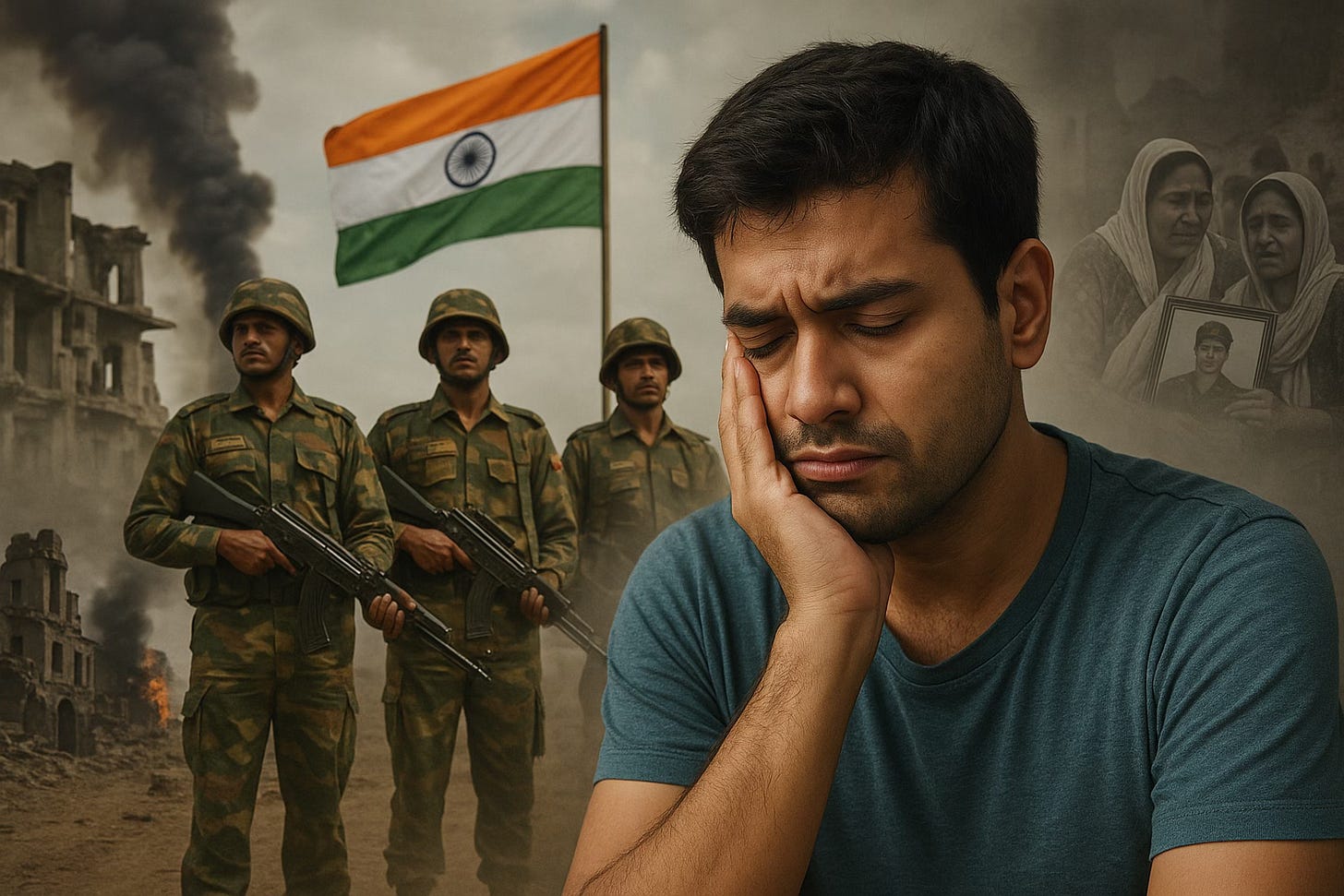The War Within: Finding Peace Amidst External Chaos
In times of external turmoil and uncertainty, it’s easy to feel swept away by the chaos around us. The media floods our minds with sensational stories, the air is thick with conflicting opinions, and the emotional weight of the situation seems too much to bear. As we witness the ongoing war, the tensions between nations, and the narratives being shaped around us, we must ask ourselves: How do we navigate this storm without losing ourselves? How do we find peace in the midst of chaos? The answer lies within — in our ability to turn inward, to elevate our consciousness, and to engage in the most important battle we face: the one within our own minds.
The War Within and Without
In the midst of ongoing the India-Pakistan war, we are often confronted with emotions that are both complex and powerful. For many, the mere mention of war stirs memories of past battles — India’s victories, the bravery of soldiers standing on the frontlines, and the pride that comes with the nation’s strength. Yet, for others, war brings painful memories of loss, the devastation of collateral damage, and the deep scars left on families who lost their loved ones. I may not have lived through the Kargil War or the wars before that, but I can understand the emotions that these events stir in the hearts of those who have.
Some celebrate victories, reliving moments of national pride, while others are left questioning the cost of it all. The physical, emotional, and mental toll on both nations is immeasurable, and the economic setbacks that accompany war cannot be ignored. The war has many sides, just as there are countless opinions and speculations surrounding its true intentions. Yet, no matter the external narratives, there’s one truth that remains: the ongoing battle we face is not just on the borders — it’s also in our hearts and minds.
The Media’s Role in Fuelling the Fire
As the war rages on, the media and social platforms amplify the chaos, feeding us a continuous loop of fear, anxiety, and anger. Whether it’s the fear of an impending war or the emotional reaction to the loss of innocent civilians, these external triggers manipulate our sympathetic drives, pushing us into fight-or-flight responses. Every piece of news becomes more sensational, more cinematic —fake narratives like the Karachi port blast by INS vikrant — driving us further into reactive emotions.
The media takes its creative liberties, making the experience of war more gripping and cinematic, drawing us into the drama and away from the reality. We find ourselves in a loop: fear, panic, desire for revenge, fleeting victories. We are caught in a cycle of reactivity, unable to truly sit with ourselves and understand how we feel about the situation. The noise, the opinions, the distractions prevent us from focusing on what truly matters: finding peace within ourselves during this external chaos.
The Power of Turning Inward
In times of external conflict, we often forget the power we have to create inner peace. When our soldiers are out there protecting us, standing firm on the frontlines, the least we can do is honor their sacrifices by embodying what truly matters — love, compassion, and gratitude. But how can we do this when we are caught in the whirlwind of external noise?
The truth is, we are so often distracted by the external chaos that we forget to look inward. Instead of allowing fear and anxiety to take root, we must consciously choose to reflect on our emotions. What do we feel about this situation? Is it fear, anxiety, pain, or uncertainty? And once we identify these feelings, we come to realize that they don’t align with what our nation stands for, nor with the values our soldiers fight to protect.
This is a time for us to show up for our soldiers by embodying peace, compassion,strength and support. Let’s choose to elevate ourselves above the reactivity and impulsiveness that the media feeds us. Instead of perpetuating the cycles of revenge and victory, let’s take a moment to reconnect with our hearts and ask: How can I contribute to the peace I seek? By becoming aware of the chaos within, we can break free from it and support our soldiers in the way they deserve — with love and gratitude.
The Real Enemy: Our Own Mind
The Bhagavad Gita offers a timeless reminder that the greatest enemy we must confront is not an external one, but our own mind. As Lord Krishna says in the Gita:
"Uddhare atma natmanam natmanamavasadayat |
Atmaiva hyatmano bandhuratmaiva ripur atmanah ||"
Translation:
"One should elevate, not degrade, oneself with the help of the mind. The mind is the friend of the conditioned soul, and his enemy as well."
— Bhagavad Gita, Chapter 6, Verse 5
Meaning:
This profound verse reminds us that our mind is both our greatest ally and our fiercest enemy. It has the power to uplift us when aligned with truth and conscious action, or it can pull us down into states of fear, anxiety, and stress when we succumb to negative patterns of thinking. The true enemy, as Lord Krishna teaches, is not the external world or others — it is the mind that governs our reactions and emotions. The key to overcoming internal chaos and finding peace is not in fighting external battles, but in mastering the mind, elevating it with self-awareness, and aligning it with higher values.
Conclusion
Let us remember that in these turbulent times, the greatest battle is not the one fought on the frontlines, but the one within ourselves. By cultivating love, compassion, and gratitude, we can break free from the cycles of fear and reactivity, and instead create a peaceful, supportive inner world. The strength of our soldiers lies in their unwavering commitment to dharma, and our strength lies in our ability to rise above the noise, to choose peace- our inner dharma , and to support them with our hearts full of love.
Let the truth prevail. Let the love and compassion in our hearts grow as a nation.
Dr. Krishna Bharath, MD









